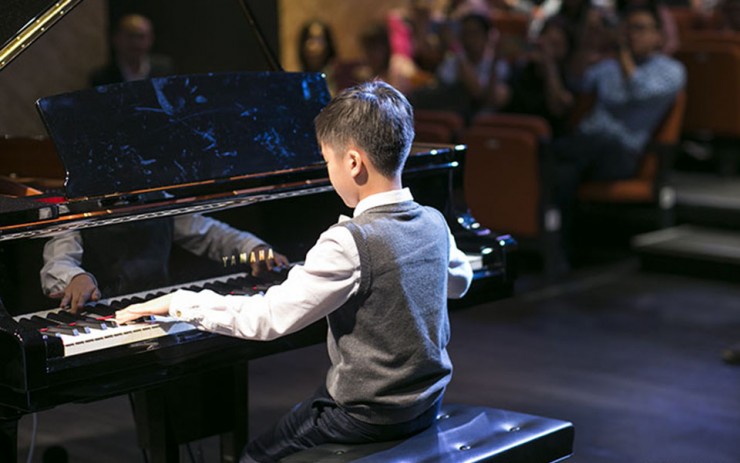10 Steps to Prepare for a Performance

Preparation/Pre-Recital
1. Slow Practice
Just because you can play a piece of music up to speed doesn’t mean that all you need to do before a recital is run through it several times. On a recital day, it’s normal to be nervous –– but nervousness often translates to rushing while playing music, or playing at a speed that naturally leads to mistakes. A day or two before the recital, make a rule that you will only practice the piece at 60% speed; on the recital day, practice it at 80% speed. That way, when you get up to perform, you’ll be used to practicing at a slower tempo, and nerves might naturally lead to playing the piece at its normal speed.
2. Mind Your Posture
Putting our bodies in certain positions can naturally make us more confident –– just look at the science behind power poses. When you perform, the stage is yours: take up space, sit up straight, take time to get comfortable before beginning your musical piece. Posture can communicate confidence to the audience. If you look calm, cool, and collected, there is a good chance that the audience will perceive the music in the same way. And remember: practicing your stage presence by visualizing an audience at home can come in handy. You have to practice how you want to appear when you perform.
3. Practice in Recital Attire
A teacher once told her music students that her worst recital experience was one that had nothing to do with the music. Apparently, a shoulder strap on her dress had come undone and she spent an entire piece trying to hold it up while continuing to play. The moral of the story: practice in the clothes you plan to wear on the recital day. For both men and women, this includes your shoes –– pedaling in dress shoes feels much different than with sandals or barefoot.
4. Simulate, Simulate, Simulate
By far, this is the most important step in your preparation for a recital day. You must find ways to simulate what a performance will look and feel like. After all, it feels much different playing for people you do not know, compared to playing for yourself or your immediate family. So, invite a couple of friends or family over that haven’t heard you play much, then practice playing your music for them. Ask someone to do something distracting while you play, in order to practice playing through distractions or mistakes. Even practice the things that aren’t related to the music –– walking to the piano confidently, bowing, sitting down at the piano (i.e. practice your stage presence). In general, you must simulate the feeling of nervousness, since that is what you will naturally feel before/during your performance.
Recital Day
5. Get Acquainted with the Instrument
Arriving with time to spare is your secret weapon against stage fright. It gives you a chance to get acclimated to the venue, check the piano, and take a deep breath before you step onto the stage. You should also plan to spend a few minutes before the recital begins acclimating yourself to the particular instrument. After all, a grand piano feels and sounds much different than an electric or upright piano. Spend the few minutes of warm-up time trying to adapt your playing to the new instrument.
6. Channel Your Inner Zen
Nerves are normal, even for experienced performers. For a number of years, I wasn’t able to eat before I performed; during audition seasons, I had to take medication to keep my hands from shaking. Really, though, nerves are a sign that you care –– that you want to play well for others and for yourself. Take a few deep breaths (in for 4, out for 8) and visualize yourself playing flawlessly. Try some power poses while waiting to play. Remember that everyone in the room wants you to do well; everyone wants to be entertained; everyone wants to celebrate the progress you’ve made in piano lessons. Root for yourself alongside your audience.
7. Embrace Imperfection
There is no such thing as a perfect performance. For one, music is art, not an objective science; two, mistakes can be heard at even the most high-profile international piano competitions. If you slip up, keep going. Chances are the audience won’t even notice. The key is to maintain your composure and continue playing with confidence. During your practice before the recital, you could even ask a friend or family member to try distracting you, to simulate a mistake. That way, you can practice continuing the piece no matter what.
After the Applause
8. Accept Compliments with Grace
When the applause comes raining down, smile, take a bow, and graciously accept the compliments. You’ve worked hard, and this is your moment to shine. Even if you feel you did not play well, most audience members know the risk you’ve taken to play in front of an unfamiliar group of people. Therefore, their applause is not only for your performance, but for your courage and preparation.
9. Reflect and Learn
After the recital, take a moment to reflect. What went well? What could you improve? This self-evaluation will guide your future practice sessions and performances. Don’t be afraid to de-brief with your teacher and talk about how it felt to perform.
10. Reward Yourself
Remember, a recital is a celebration of your musical journey. Go get ice cream, bubble tea, or Chinese food. Then, get back to work during your next lesson to prepare for your next performance.
